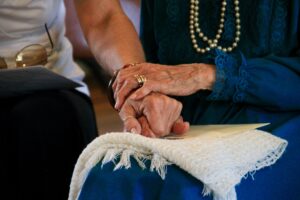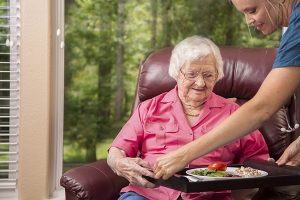
As an adult child, you have your own life and responsibilities. You need plenty of sleep to prepare you for daily tasks like taking care of your kids, performing well at work, running errands, etc. If your elderly parent needs home care overnight and you’re their primary caregiver, exhaustion is your new normal. If you’re not the primary caregiver but your aging parent needs help at night, you may not know what to do.
Are you an adult child with aging parents?
Are your elderly parents in need of in-home night care?
Do you know what overnight care for seniors is?
In-home night care for the elderly is a way for adult children and their parents to have peace of mind during nighttime hours. Home care overnight provides aging seniors with a caregiver to support them throughout the night.
Keep reading to learn about overnight care for elderly parents and get answers to important questions like, “Can overnight caregivers sleep?”
What Is In-Home Night Care?
Nighttime presents aging seniors with many potential difficulties. They can wake up in the middle of the night confused or unaware of their surroundings, presenting a significant fall risk. If they’ve recently had surgery, getting out of bed to use the bathroom may be challenging. Aging adults with Alzheimer’s or dementia can easily wander out of the house at night.
Overnight care for elderly parents provides your parents with an in-home caregiver as they sleep. This caregiver remains awake, alert, and ready to help your loved one with any nighttime task.
Unless you’re currently the primary caregiver for your aging parents, you may not know if your parents need help at night or not. Here are some signs that your elderly parent could benefit from in-home night care:
- Can’t make it to the bathroom on time
- Lives with dementia, Alzheimer’s, or another mental illness
- Recovering from a surgery that limits mobility
- Easily forgetful or unaware of surroundings
Do you think your aging parent can benefit from home care overnight? Below, we answer some of the top questions about overnight care for seniors.
What’s the Difference Between Live-In Care and Overnight Care?
Live-in care and overnight care may sound similar, but they’re different.
Live-In Caregiver Definition
A live-in caregiver lives at an individual’s house, caring for them 16 hours each day, but given at least 8-hours of sleep each night. Live-in caregivers provide care during most of the day, but they also receive an extended time to rest.
Overnight Caregiver Definition
An overnight caregiver stays awake and alert overnight at an individual’s home for the entirety of the 8- or 12-hour shift. The main difference between live-in care and overnight care is whether the caregiver can sleep or not.
To provide consistent care to the client throughout the 24-hours, overnight caregivers will work closely with any daytime caregivers.
Can Overnight Caregivers Sleep?
Generally, overnight caregivers for the elderly aren’t allowed to sleep. However, some agencies may let their specific overnight caregivers sleep. It’s best to check each agency specifically to see what their overnight caregiver policies are.
Who Can Benefit from Overnight Care?
Overnight home care for the elderly is especially beneficial for certain groups of aging seniors.
Seniors with Dementia
Elderly adults with dementia can be confused or begin to wander when they wake up. Overnight care for seniors with dementia provides an extra set of eyes during your parents’ non-sleeping hours. The caregiver can help them reach the bathroom and return to bed to keep from wandering or getting lost. If your parent wakes up confused or unaware of their surroundings, the caregiver can help re-orient them.
Additionally, some patients with dementia will prefer to be awake during the nighttime hours. For these clients, the overnight caregiver is still responsible for supervising and caring for them as if they were a daytime caregiver.
Seniors at Risk of Falling
If you have aging loved ones who need assistance walking or are at risk of falling, overnight in-home care is beneficial. Caregivers can help your parent get in and out of bed, move to and from different rooms, turn on lights, or remind them to use a walker if necessary.
Seniors Recovering from Surgery
Overnight in-home care is also valuable for loved ones who have recently returned home after surgery. Seniors recovering from an operation may need help getting ready for bed, getting in and out of bed, reaching the bathroom safely, or toileting. Postoperative delirium affects up to 50% of seniors and is all the more reason to provide them with overnight care.
Senior Insomniacs
Elderly adults with insomnia may not sleep much, if at all. Caregivers can sit with your aging parent and comfort them until they fall asleep. Alternatively, your parent may want to get out of bed and begin normal daily activities. As parents get out of bed and start moving around, the overnight caregiver can assist and tend to their needs.
What Does an Overnight Caregiver Do?
An overnight caregiver’s main priority is assisting the client when they wake up. The caregiver must be close to the client to hear if they call for help or need anything during the night.
The exact overnight caregiver placement in the client’s house will depend on each family’s needs and preferences. Some families may want the caregiver to sit in the room with their loved ones, while other families prefer that the caregiver monitor their elderly parents from another room.
Overnight caregiver duties will be client-specific, but typical responsibilities include:
- Toileting assistance
- Reorientation support
- Help with getting in and out of bed
- Safely moving to and from the bathroom
- Making a midnight snack
- Light housekeeping, if appropriate
Ultimately, the caregiver is responsible for responding to and caring for the client as soon as they wake up.
How to Get Overnight Home Care for Elderly Parents
Can overnight caregivers sleep? Generally, no, and this is what makes them so valuable.
Overnight caregivers are awake, alert, and ready to help your elderly parent during nighttime hours. Getting aging loved ones overnight in-home care can provide them (and you) peace of mind during the night.
If your parent has insomnia, dementia, is incontinent at night, or is recovering from surgery, they will likely benefit from home care overnight.
At Stowell Associates, we strive to make life more manageable for families and their loved ones through exceptional in-home care. Our caregivers are expertly selected and highly trained to provide premium in-home care at any hour of the day.
Start a conversation with our Care Advisors and see how we can support your elderly parents with home care overnight and during the day.












